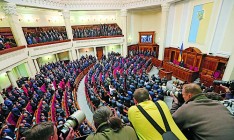Politics
clean handsAdoption of the main anti-corruption laws has been postponed until October 14

Yesterday, the Verkhovna Rada postponed the adoption of the main bills of the anti-corruption package proposed by the president and the Cabinet of Ministers on its last working day. Despite this, the law on in absentia justice, which was largely promoted by the VR Speaker Oleksandr Turchynov, was voted for. Members of parliament believe this law is the pre-election ticket of the People’s Front.
In absentia activeness
Yesterday the Ukrainian parliament made the first step towards the adoption of the package of anti-corruption bills initiated by the president and the Cabinet of Ministers. VR deputies adopted four bills in the first reading and the bill on in absentia justice in full in the second reading.
On the eve of the VR session leaders of factions met with President Petro Poroshenko. As Deputy Chair of the Batkivshchyna faction Dmytro Shlemko told Capital, the head of state proposed to put his bill on creating the National Anti-corruption Bureau to vote, thereby shelving the alternative bill proposed by people’s deputy Serhiy Pashynskiy (Batkivshchyna).
Shlemko says the president warned that if the deputies decide to choose between the two bills, neither will gain the required amount of votes. “Poroshenko needed to clear the field for his bill. In the end, it was decided that the document will be put up for vote and be passed in the first reading. Meanwhile, preparations to the second reading of the bill on October 14 will be conducted according to the abridged procedure,” Shlemko told the publication.
He specified that the Batkivshchyna faction agreed to vote for the president’s bill only after Poroshenko promised to submit to the VR the bill on the prosecutor general’s office on October 14 for consideration in the second reading in full.
People’s deputy Pavlo Rozenko (UDAR) explained to Capital that adoption of the president’s bill and three government bills in the first reading was nothing more than a “compromise”. “There were not votes and pressure that Turchynov applies would not help the situation,” Rozenko noted.
Nevertheless, the VR speaker managed to push through the bill No. 4448-a “On the Inevitability of Punishment for Certain Crimes against the Principles of National Security, Public Safety and Corruption”. Deputies voted four times to pass this bill in the second reading. MP Oleh Shablatovych (independent) named the voting for this bill a failure of the work of the VR. “The votes of the Batkivshchyna, Svoboda and UDAR parties were not enough and there were those that were not satisfied with this law. However, Turchynov managed to push it through,” Shablatovych told Capital.
MP Volodymyr Yavorivskiy (Batkivshchyna) told the publication that a number of deputies compared the law that would introduce the notion of in absentia justice with the “dictatorial laws” adopted on January 16. “Responding to this, Turchynov said the document was examined by members of the Council of Europe and promised that he will order the publication of the names of non-voters in the newspaper Holos Ukrainy (Voice of Ukraine) and this tactic worked,” he told Capital.
Shablatovych attributes Turchynov’s persistence to the adoption of the law regarding in absentia justice as a pre-election necessity. “I think now the People’s Front will shout on every corner that it returned the residence of former president Viktor Yanukovych in Mezhyhirya to the people,” Shablatovych assured.
As a reminder, the law on in absentia justice adopted by the Verkhovna Rada envisages that court proceedings can be conducted in the absence of the accused individual. The document also proposes that a person suspected of committing a crime be issued a notification even if the whereabouts of such an individual were not determined.
Also, now confiscation of property may serve as punishment for acts of forced amendments to or subversion of the constitutional order, encroachment on the territorial integrity and inviolability of Ukraine, the life of a state or public activist, state treason, sabotage, espionage, acts of terrorism including appeals and involvement of other individuals, formation of terrorist organizations and illegal armed forces. Such individuals will not be released from temporary detainment cells over the course of investigation in the case of arrest.
Elections on the horizon
There are plans that anti-corruption bills that were adopted in the first reading by the Verkhovna Rada yesterday will be passed into law on October 14, when the last session of the parliament of the current convocation will be held.
Representatives of factions surveyed by Capital share the opinion that the success of voting will directly depend on the content of bills and amendments to them. The most heated dispute at the moment is about the presidential bill on creation of an anti-corruption bureau. “I am ready to vote for this bill, but not if the head of the bureau is paid 12 million hryvnia upon retirement,” said Shablatovych.
People’s deputy Pavlo Rozenko believes the fact that the parliamentary elections are just around the corner could have an impact on the results of voting. “Everybody understands that now is the time, when they can advertise themselves and tell the voters how they will fight against corruption,” he told Capital.






 of the agreement of syndication with Financial Times Limited are strictly prohibited. Use of materials which refers to France-Presse, Reuters, Interfax-Ukraine, Ukrainian News, UNIAN agencies is strictly prohibited. Materials marked
of the agreement of syndication with Financial Times Limited are strictly prohibited. Use of materials which refers to France-Presse, Reuters, Interfax-Ukraine, Ukrainian News, UNIAN agencies is strictly prohibited. Materials marked  are published as advertisements.
are published as advertisements.